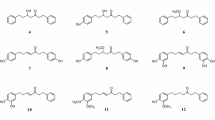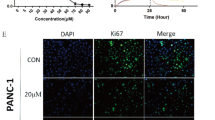Abstract
Purpose
Pancreatic cancer has been a serious disease worldwide for its high mortality. Cucurbitacin E is a member of triterpenoid family isolated from plants showing antiproliferative activity on various cancer cells. In this study, we have explored whether cucurbitacin E also has an anti-tumor effect on pancreatic cancer cells.
Methods
Human pancreatic cancer cells PANC-1 were used to explore the effect and possible mechanisms of cucurbitacin E on cell cycle progression, apoptosis and proliferation.
Results
Cucurbitacin E has inhibited the growth of PANC-1 cells in a dose- and time-dependent manner, and has caused accumulation of cells at the G2/M phase as well as apoptosis. Western blotting also showed that cucurbitacin E treatment can inhibit STAT3 phosphorylation while upregulate p53 expression.
Conclusions
Our results suggested that cucurbitacin E may be an effective regimen for the chemotherapy of pancreatic cancer.





Similar content being viewed by others
References
Al Zaid Siddiquee K, Turkson J (2008) STAT3 as a target for inducing apoptosis in solid and hematological tumors. Cell Res 18:254–267
Barton CM, Staddon SL, Hughes CM, Hall PA, O’Sullivan C, Kloppel G, Theis B, Russell RC, Neoptolemos J, Williamson RC (1991) Abnormalities of the p53 tumour suppressor gene in human pancreatic cancer. Br J Cancer 64:1076–1082
Bartz C, Ziske C, Wiedenmann B, Moelling K (1996) P53 tumor suppressor gene expression in pancreatic neuroendocrine tumour cells. Gut 38:403–409
Brell JM, Matin K, Evans T, Volkin RL, Kiefer GJ, Schlesselman JJ, Dranko S, Rath L, Schmotzer A, Lenzner D, Ramanathan RK (2009) Phase II study of docetaxel and gefitinib as second-line therapy in gemcitabine pretreated patients with advanced pancreatic cancer. Oncology 76:270–274
Butz J, Wickstrom E, Edwards J (2003) Characterization of mutation and loss of heterozygosity of 53 and K-ras-2 in pancreatic cancer cell lines by immobilized polymerase chain reaction. BMC Biotechnol 3:11
Duan Z, Foster R, Bell DA, Mahoney J, Wolak K, Vaidya A, Hampel C, Lee H, Seiden MV (2006) Signal transducers and activators of transcription 3 pathway activation in drug-resistant ovarian cancer. Clin Cancer Res 12:5055–5063
Duncan MD, Duncan KL (1997) Cucurbitacin E targets proliferating endothelia. J Surg Res 69:55–60
Germain D, Frank DA (2007) Targeting the cytoplasmic and nuclear functions of signal transducers and activators of transcription 3 for cancer therapy. Clin Cancer Res 13:5665–5669
Jayaprakasam B, Seeram NP, Nair MG (2003) Anticancer and antiinflammatory activities of cucurbitacins from Cucurbita andreana. Cancer Lett 189:11–16
Kalthoff H, Schmiegel W, Roeder C, Kasche D, Schmidt A, Lauer G, Thiele H-G, Honold G, Pantel K, Riethmuller G, Scherer E, Maurer J, Maacke H, Deppert W (1993) P53 and K-RAS alterations in pancreatic epithelial cell lesions. Oncogene 8:289–298
Kang SP, Saif MW (2008) Pharmacogenomics and pancreatic cancer treatment. Optimizing current therapy and individualizing future therapy. J Pancreas (Online) 9:251–266
Kullmann F, Hollerbach S, Dollinger MM, Harder J, Fuchs M, Messmann H, Trojan J, Gabele E, Hinke A, Hollerbach C, Endlicher E (2009) Cetuximab plus gemcitabine/oxaliplatin (GEMOXCET) in first-line metastatic pancreatic cancer: a multicentre phase II study. Br J Cancer 100:1032–1036
Lau ST, Lin ZX, Liao Y, Zhao M, Cheng CH, Leung PS (2009) Bruceine D induces apoptosis in pancreatic adenocarcinoma cell line PANC-1 through the activation of p38-mitogen activated protein kinase. Cancer Lett 281:42–52
Lee GW, Kim HJ, Ju JH, Kim SH, Kim HG, Kim TH, Kim HJ, Jeong CY, Kang JH (2009) Phase II trial of S-1 in combination with gemcitabine for chemo-naive patients with locally advanced or metastatic pancreatic cancer. Cancer Chemother Pharmacol 64:707–713
Lewis HD, Winter A, Murphy TF, Tripathi S, Pandey VN, Barton BE (2008) STAT3 inhibition in prostate and pancreatic cancer lines by STAT3 binding sequence oligonucleotides: differential activity between 5′ and 3′ ends. Mol Cancer Ther 7:1543–1550
Li J, Orr B, White K, Belogortseva N, Niles R, Boskovic G, Nguyen H, Dykes A, Park M (2009) Chmp 1A is a mediator of the anti-proliferative effects of all-trans retinoic acid in human pancreatic cancer cells. Mol Cancer 8:7
Liu T, Zhang M, Zhang H, Sun C, Deng Y (2008) Inhibitory effects of cucurbitacin B on laryngeal squamous cell carcinoma. Eur Arch Otorhinolaryngol 265:1225–1232
Momma K, Masuzawa Y, Nakai N, Chujo M, Murakami A, Kioka N, Kiyama Y, Akita T, Nagao M (2008) Direct interaction of cucurbitacin E isolated from Alsomitra macrocarpa to actin filament. Cytotechnology 56:33–39
Moses SA, Ali MA, Zuohe S, Du-Cuny L, Zhou LL, Lemos R, Ihle N, Skillman AG, Zhang S, Mash EA, Powis G, Meuillet EJ (2009) In vitro and in vivo activity of novel small-molecule inhibitors targeting the pleckstrin homology domain of protein kinase B/AKT. Cancer Res 69:5073–5081
Nieto J, Grossbard ML, Kozuch P (2008) Metastatic pancreatic cancer 2008: is the glass less empty? Oncologist 13:562–576
Niu G, Wright KL, Ma Y, Wright GM, Huang M, Irby R, Briggs J, Karras J, Cress WD, Pardoll D, Jove R, Chen J, Yu H (2005) Role of Stat3 in regulating p53 expression and function. Mol Cell Biol 25:7432–7440
Pan X, Arumugam T, Yamamoto T, Levin PA, Ramachandran V, Ji B, Lopez-Berestein G, Vivas-Mejia PE, Sood AK, McConkey DJ, Logsdon CD (2008) Nuclear factor-kappaB p65/relA silencing induces apoptosis and increases gemcitabine effectiveness in a subset of pancreatic cancer cells. Clin Cancer Res 14:8143–8151
Qiu Z, Huang C, Sun J, Qiu W, Zhang J, Li H, Jiang T, Huang K, Cao J (2007) RNA interference-mediated signal transducers and activators of transcription 3 gene silencing inhibits invasion and metastasis of human pancreatic cancer cells. Cancer Sci 98:1099–1106
Rosa DD, Ismael G, Lago LD, Awada A (2008) Molecular-targeted therapies: lessons from years of clinical development. Cancer Treat Rev 34:61–80
Ruggeri B, Zhang Z-Y, Caamono J, DiRado M, Flynn SD, Klein-Szanto AJP (1992) Human pancreatic carcinomas and cell lines reveal frequent and multiple alterations in the p53 and Rb-1 tumor-suppressor genes. Oncogene 7:1503–1511
Sahu RP, Srivastava SK (2009) The role of STAT-3 in the induction of apoptosis in pancreatic cancer cells by benzyl isothiocyanate. J Natl Cancer Inst 101:176–193
Saif MW, Tytler E, Lansigan F, Brown DM, Husband AJ (2009) Flavonoids, phenoxodiol, and a novel agent, triphendiol, for the treatment of pancreaticobiliary cancers. Expert Opin Investig Drugs 18:469–479
Sun J, Blaskovich MA, Jove R, Livingston SK, Coppola D, Sebti SM (2005) Cucurbitacin Q: a selective STAT3 activation inhibitor with potent antitumor activity. Oncogene 24:3236–3245
Sun X, Zhang J, Wang L, Tian Z (2008) Growth inhibition of human hepatocellular carcinoma cells by blocking STAT3 activation with decoy-ODN. Cancer Lett 262:201–213
Tannin-Spitz T, Grossman S, Dovrat S, Gottlieb HE, Bergman M (2007) Growth inhibitory activity of cucurbitacin glucosides isolated from Citrullus colocynthis on human breast cancer cells. Biochem Pharmacol 73:56–67
Wakimoto N, Yin D, O’Kelly J, Haritunians T, Karlan B, Said J, Xing H, Koeffler HP (2008) Cucurbitacin B has a potent antiproliferative effect on breast cancer cells in vitro and in vivo. Cancer Sci 99:1793–1797
Wang ML, Foo KF (2009) Adjuvant chemoradiotherapy for high-risk pancreatic cancer. Singap Med J 50:43–48
Yin D, Wakimoto N, Xing H, Lu D, Huynh T, Wang X, Black KL, Koeffler HP (2008) Cucurbitacin B markedly inhibits growth and rapidly affects the cytoskeleton in glioblastoma multiforme. Int J Cancer 123:1364–1375
Zhang M, Zhang H, Sun C, Shan X, Yang X, Li-Ling J, Deng Y (2009) Targeted constitutive activation of signal transducer and activator of transcription 3 in human hepatocellular carcinoma cells by cucurbitacin B. Cancer Chemother Pharmacol 63:635–642
Zhao S, Venkatasubbarao K, Lazor JW, Sperry J, Jin C, Cao L, Freeman JW (2008) Inhibition of STAT3 Tyr705 phosphorylation by Smad4 suppresses transforming growth factor beta-mediated invasion and metastasis in pancreatic cancer cells. Cancer Res 68:4221–4228
Acknowledgments
This work has been sponsored by grants from the Scientific Research Foundation for the Returned Overseas Chinese Scholars, State Education Ministry (20060331) and the Natural Science Foundation of Liaoning Province, China (20082092).
Author information
Authors and Affiliations
Corresponding author
Additional information
C. Sun and M. Zhang contributed equally to this work.
Rights and permissions
About this article
Cite this article
Sun, C., Zhang, M., Shan, X. et al. Inhibitory effect of cucurbitacin E on pancreatic cancer cells growth via STAT3 signaling. J Cancer Res Clin Oncol 136, 603–610 (2010). https://doi.org/10.1007/s00432-009-0698-x
Received:
Accepted:
Published:
Issue Date:
DOI: https://doi.org/10.1007/s00432-009-0698-x




